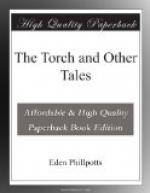“He’s so much impressed by his own ugliness,” Mary Cobley would tell them, “that he never would rise to the thought of axing a female to take him; though I tell the man that the better sort of woman ain’t prone to pick a husband, like a bird picks a cherry, for the outside.”
Which was true, of course, for modesty might be said to be Jack’s strong suit, and he couldn’t abear the thought of inflicting his ugly mug on a nice young woman, which was the only sort of woman he felt he’d got any use for.
Then, after he’d been home six months, he found his parent in tears one night, and she explained the fatal situation that had arose with respect to her neighbour, Mrs. Pedlar.
“Poor Jane be up against it,” she said. “Things have come to a climax in that quarter at last and, by all accounts, she’s got to leave her lifelong home. And God judge Nicholas Bewes, for he’s doing a thing that will put him on the wrong side of the Books.”
Well, Jack had called on Mrs. Pedlar, of course, her being his mother’s friend; but, like most other people, he’d found the poor woman parlous uninteresting. Her niece, however, was different, for in Milly Boon the folk granted you could find nought but beauty and good temper, and remarkable patience for a young woman. She was a lovely piece, with pretty gold hair and high complexion, and grey, bright eyes. Her mouth was rose-red and tolerable small, but always ready for a smile, and she was a slim, active creature, a towser for work, yet full of the joy of life and ready enough for a mite of pleasure if it came her way.
A good few courted her, but she had no eye for ’em, though civil to all; but now a desperate man was in the market, and he showed such a lot of determination over her and was so cruel set upon Milly that folk said he’d be bound to have his way—and why not?
’Twas Farmer Bewes—his son Richard—who wanted afore all else to have Milly to wife, and it looked right and reasonable, because he was the handsomest man in Little Silver, or ten miles round for that matter; and folk agreed they would make a mighty fine pair. Dicky was a flaxen chap, too, and shaved clean and had a beautiful face without a doubt. He stood six feet two inches, and was finely put together. But there was a black mark against him where the women were concerned, and he’d done a few things he didn’t ought; because girls went silly over him.
An only child was Richard, and the apple of his father’s eye, and spoilt from his cradlehood by both parents; and so, when he wanted Milly Boon, they didn’t see why not, though she was a pauper, because his father felt that it might be a good thing for Dick to wed a wife and settle down.
But it takes two to a job of that sort, and Milly hung fire, much to the misery of young Bewes. He spared no pains in his courting, and told her how she was making an old man of him before his time and robbing him of his sleep, and his appetite, and his wish to live and so on; but she knew very well indeed he’d said all that and a lot more to other maidens, and she felt, deep down in her nature, he wasn’t the right one for her, despite his fine appearance and education. For he was a clever man and had been taught knowledge at a Secondary School.




